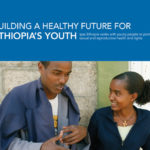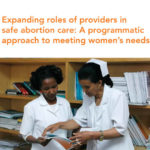This factsheet shares the results of a national study by the Guttmacher Institute and Ipas, in collaboration with the Ethiopian Society of Obstetricians and Gynecologists and the Ethiopian Public Health Association, and in conjunction with Ethiopia’s Federal Ministry of Health.
This paper estimates the incidence of legal and clandestine abortions and the severity of abortion-related complications among adolescent and nonadolescent women in Ethiopia in 2014. We find no evidence that adolescents are more likely than older women to have clandestine abortions. However, the higher abortion and pregnancy rates among sexually active adolescents suggest that they face barriers in access to and use of contraceptive services. Further work is needed to address the persistence of clandestine abortions among adolescents in a context where safe and legal abortion is available.
To reduce deaths and disabilities from unsafe abortion, Ethiopia liberalized its abortion law in 2005 to allow safe abortion under certain conditions. This study aimed to measure how availability and utilization of safe abortion services has changed in the last decade in Ethiopia, drawing on results from nationally representative health facility studies conducted in Ethiopia in 2008 and 2014. Using the Safe Abortion Care Model as a framework of analysis, the study found that service availability and quality has increased, but that access to lifesaving comprehensive care still falls short of recommended levels.
Contraception is an essential element of high-quality abortion care. However, women seeking abortion often leave health facilities without receiving contraceptive counselling or methods, increasing their risk of unintended pregnancy. This paper describes contraceptive uptake in 319,385 women seeking abortion in 2,326 public-sector health facilities in eight African and Asian countries. Ministries of Health integrated contraceptive and abortion services, with technical assistance from Ipas. Overall, postabortion contraceptive uptake was 73 percent. The findings demonstrate high contraceptive uptake when it is delivered at the time of the abortion, a wide range of contraceptive commodities is available, and ongoing monitoring of services occurs.
This paper reports results from a nationally representative health facility study conducted in Ethiopia in 2008. It provides the first national snapshot to measure changes in a dynamic abortion care environment.
To address the knowledge gap that exists in costing unsafe abortion in Ethiopia, estimates were derived of the cost to the health system of providing postabortion care (PAC), based on research conducted in 2008.
A comprehensive structured program design, collaboration between the MOH and Ipas, and provider dedication enabled successful introduction of second-trimester abortion services in major regions/states of Ethiopia. A focus on second- trimester medical abortion allows for rapid service introduction without extensive changes to facilities, equipment, or staffing as the needs are similar to obstetric care.
Both Wubalem and Chaltu live only five kilometers from the nearest public health clinic. Under Ethiopian law, both have the right to safe, legal abortion. Yet, because of unnecessarily broad interpretation of U.S. government policy, one was denied this fundamental right.

The Center for Health, Human Rights and Development (CEHURD), in partnership with Ipas Africa Alliance, held a regional exchange learning webinar on 25 August 2021, hosted by the Africa Coalition for Safe Abortion (ACSA). ACSA is a broad-based coalition of regional health and human rights civil society organizations that are committed to advocate for access to safe and legal abortion services in line with the Maputo Protocol. This one-page fact sheet outlines the discussion and actions taken during the learning exchange.

This publication describes Ipas Ethiopia’s comprehensive approach to addressing the sexual and reproductive health and rights of young people. Ipas supports university-based “Help Points” and community-based Reproductive Health Corners that provide youth-appropriate information and counseling on sexual and reproductive health, with a focus on contraception, unwanted pregnancy and safe abortion.

This brief examines the key results from expanding abortion service provision to midlevel providers in 10 Ipas country programs throughout Asia and Africa, including a global analysis of programmatic data from all 10 countries and two case studies (Ethiopia and Bangladesh).


